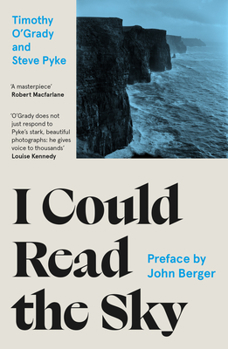I Could Read the Sky
Select Format
Select Condition 
Book Overview
With a foreword by John Berger I Could Read the Sky is a collaboration, in the shape of a lyrical novel, between writer Timothy O'Grady and photographer Steve Pyke. It tells the story of a man coming of age in the middle of this century. Now at its end, he finds himself alone, struggling to make sense of a life of dislocation and loss. He remembers his childhood in the west of Ireland and his decades of bewildered exile...
Format:Paperback
Language:English
ISBN:1800182716
ISBN13:9781800182714
Release Date:September 2023
Publisher:Unbound
Length:288 Pages
Weight:0.95 lbs.
Dimensions:0.9" x 5.0" x 7.7"
Customer Reviews
4 ratings
A lyrically crafted novel about dislocation and exile
Published by Thriftbooks.com User , 24 years ago
I am very familiar with the works of old time Irish writers including the works of James Joyce who wrote about Ireland in exile. I still don't know much about modern Irish novelists until I had the opportunity of meeting and listening to parts of Timothy O'Grady's novel at Perth Writer's Festival early this year. Immediately afterwards I bought a copy and later talked to Timothy briefly about writers in exile and their struggle with dislocation. This story is not only about dislocation and exile. This is the story of a man coming of age and following a journey during which he struggles to make sense of his life, dislocation, loss of love and loneliness.This lyrically crafted novel is a great collaboration between O'Grady and photographer Steve Pyke. They collectively create a visual journey of a musical Irishman, his journey from one location to another, looking for work and the love of his life. O'Grady's begins his novel with a description of the protagonist's life back at home as a child: "This room is dark, as dark as it ever gets - the hour before dawn in winter. I have sounds and pictures but they flit and crash before I can get them..." For me, it is a metaphor of not been able to recreate the places and the people he left behind as a result of his journey. O'Grady ends his novel with a similar narrative: "In the room now a breeze comes in through the window and on it there is the smell of spring. Downstairs the girl turns on her radio... There is a time after long work when you can look for strength and there is nothing there....In the morning light I let go."In between, we learn about his journey, his recollection of Irish landscapes, the places left behind, the music he played and his love. But this is not just a mere description of a nostalgic mental journey of an Irishman in exile. This can happen anywhere, anytime, and to anyone.Reading this novel is like watching a visually crafted documentary embedded with voice and music that we can see and hear.I'm glad that I met O'Grady and read his novel as my introduction to modern Irish novelists. But this novel had another positive effect on me. When I met O'Grady I was writing a novel about my own dislocation. This novel inspired me to look at my private journey again and again, and continue my writing in exile!I recommend this book to anyone interested in the beauty and tragic of moving from one place to another.
Beautiful and touching...
Published by Thriftbooks.com User , 24 years ago
Tim O'Grady creates exquisitely wrought, archetypal prose that could even overpower Pyke's perfect documentary photos. (Without offense to Walker Evans, now I'm wishing Pyke had been around to collaborate with James Agee).Amazingly, requires very little interest in Ireland or the Irish - O'Grady is from Chicago anyway and this book is more about experiences of all mankind. His crystalline narrative is hardly bound by ethnicity. Extraordinary and inspiring new use of the verb, can. If you read poetry, you couldn't regret buying this experimental novel.
Are you interested in Irish culture and literature...?
Published by Thriftbooks.com User , 25 years ago
... then buy, borrow or steal a copy! Never before have I read such a good exploration of Irish exile. Stranded in a dismal flat in England, the protagonist remembers his happy childhood in Ireland, the rough living and working conditions in England, and his only love. The language is quite simple and often Hiberno Irish, but deeply imaginative and so lyrical, that the line between prose and poetry gets blurred. The beautiful black/white pictures added to this book, and the author's ability to portray Irish music help to give an insight into Irish culture. Sometimes it's like watching a documentary, and suddenly you can't help but feeling you're listening to a song; a song of heartache and terrible longing. Despite far from being soppy the book is very moving in the end; you actually hope for a happy ending. But that wouldn't be Irish.
Beautiful and tragic
Published by Thriftbooks.com User , 25 years ago
This book is beautiful and tragic and joyful and moving, all at the same time and independently over the course of the story. Through the poetic language of the text and the poetic imagery of the photos, the drama of every day life in Ireland is brought across as quietly epic, if such a thing can be.





